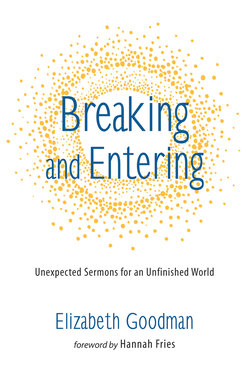Читать книгу Breaking and Entering - Liz R. Goodman - Страница 8
Casting Spells—Old Testament
ОглавлениеAn Aside
My son, Tobias, once asked me, “What’s the most powerful word?”
“I don’t know,” I said, distracted. I was in the middle of something. I’m always in the middle of something.
“Liz,” he said.
“Yeah?” I turned my head reflexively, my distraction dissipated.
“That’s the most powerful word,” he said, “your own name.”
I don’t believe in magic. Maybe that goes without saying. I mean, who does anymore?
And yet.
For most of us, our first word is mama. That’s true the world over. Mama is, for most of us, the first word we ever speak. The motion—lips, mouth, tongue, breath—it takes to make mama mimics suckling. Mama, then, means food, nurturance, and so (on the aggregate) means mother.
The moment when a baby can at last murmur mama with intent is a watershed moment. It’s when the baby can hold mama in mind, can conjure up mama in image and promise, can maybe even make her come, respond! Now the existence of the one who sustains life is no longer snuffed out when simply out of the range of smell or sight. Now the ongoing presence and participation of mama is no longer coupled with her immediate proximity. To be able to say “mama,” then, is a power akin to magic.
“Whoshall I tell them sent me?” Moses asked the bush that burned though unconsumed. A voice had spoken to Moses through the bush, had told him that the Lord had observed the misery of the people enslaved, had heard their groans on account of the taskmasters. And so the Lord was sending Moses to Pharaoh, sending him to bring the people enslaved out of Egypt.
Of course, at this Moses wondered, likely incredulous, “Who am I that I should go to Pharaoh?” But moreover, who are you? “If I come to the Israelites and say to them, ‘The God of your ancestors has sent me to you,’ and they ask me, ‘What is his name?’ what shall I say to them?”
The stakes were high here. Moses was asking an impertinent thing. It had long been known that to know the name of a god was to have power over that god. Before anyone knew about the Living God (though a few had their suspicions); back when every nation and every people had their own god or pantheon of gods; back when even households had gods, kept them there on the shelf with their pots and kettles—everyone knew that to know the name of the god was to have power over the god.
And so this god, the God of Abraham and Isaac and Jacob, had demurred about his name. He had lots of nicknames. Even according to Scripture, he had lots of referents: El Shaddai; Elohim or Eloyin; Adonai, and simply El, that is, “God.” But not until this moment had any person dared to ask God, “What is your name?”
That God answered is an astonishing act of submission. But the answer itself calls that then into question. “YHWH,” an utterance that can’t really be uttered, a puff of air that signifies being. “I am that I am,” or “I am who is,” and from then on in Scripture, simply “the LORD.”
It’s a strange name, imprecise and as mystifying as it is clarifying. But the fact that God told Moses suggests a few things. That God wanted us to know God’s name, that God wants us to know God’s name, that God submits himself to relationship with us—these are all suggestions of the story.
But so are these: that God meant for us to know that knowing God’s name is not so straightforward a thing, that God wants us to know that to know God’s name is to know that God’s name cannot be known. We can invoke God, as in a prayer of invocation. But here our power over God ends. Here it becomes instead power with.
We should remember this whenever we mean for God to do our bidding, and we’d be wise to remember this whenever others speak of God as doing their bidding. Like a good mother, God responds. God even provides. But God doesn’t obey. And whenever we mean to cast a spell on God, we’re opening the possibility that God might cast a spell on us—to do justice, to love kindness, and to walk humbly with God.
